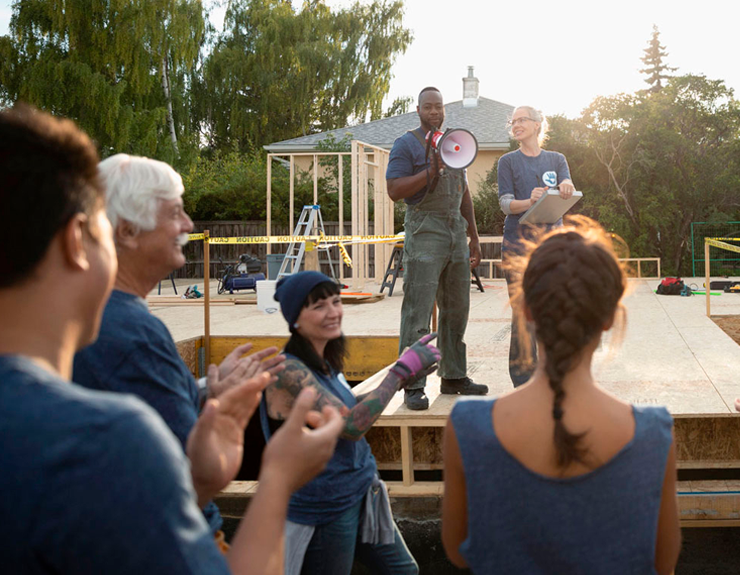ESG Social
At Fannie Mae, we are dedicated to improving access to the social benefits of affordable homes and rentals for families across the country. To do so means expanding access to reliable homebuying and renting resources to help an increasingly diverse generation of homebuyers and renters make informed decisions.
Social responsibility also means fostering an inclusive workforce and industry that better reflects the diversity of the people it serves. Our focus on diversity and inclusion (D&I) helps us deliver on our enduring mission.
On this page:
Housing affordability
We help make access to housing in the United States attainable and affordable for low- and moderate-income borrowers and renters, and use our market presence to help preserve and increase the supply of quality affordable housing. This work is not just an important part of Fannie Mae’s mission — it is what we were chartered to do. We design our underwriting standards, credit policies, and business practices to help ensure the safety and soundness of mortgage financing. We explore ways to increase the supply of affordable homes and rentals through efforts such as expanding financing options for manufactured housing and rehabilitating our real estate owned (REO) properties. This exploration, along with our work with industry partners, allows us to continue providing pathways to affordable homes.
True to our Charter to serve all areas of housing, our Duty to Serve initiative brings innovative mortgage financing solutions to the country’s key overlooked markets — manufactured housing, preservation of affordable housing, and rural housing. Since launching our Duty to Serve efforts in 2018, we have provided $382.3 billion total liquidity to these underserved market segments, resulting in 251,630 home loans purchased and 3.4 million multifamily units financed.
*Totals reflect 2018-2022. Data represents Fannie Mae’s determination of qualifying Duty to Serve activities, and are subject to restatement or revision based on FHFA review. Fannie Mae’s 2022 results have not been validated. In 2022, only purchase money mortgage single-family loans were included in total calculations.
![]()
Single-family
Our affordable Single-Family products include HomeReady® , HFA Preferred™, Community Seconds®, and MH Advantage®. In 2023, we helped finance 189,439 mortgages for very low- and low-income homebuyers. Additionally, we helped finance 382,384 first-time homebuyer mortgages – more than 45% of our single-family mortgage acquisitions.
We provide homebuyer education as part of the loan application process to help buyers successfully purchase and own their homes through HomeView®, our online education course. In 2023, over 226,000 first-time prospective homebuyers completed the course and earned their certificate of completion.
![]()
Multifamily
Our Multifamily financing solutions feature a variety of products and programs, including Low-Income Housing Tax Credits (LIHTC), Healthy Housing Rewards™, Sponsor-Initiated Affordability (SIA), and many others. Our LIHTC program helps develop affordable rental housing by offsetting project costs with equity instead of more expensive debt. From the beginning of 2018 through December 31, 2023, we committed approximately $4 billion in net equity to LIHTC investments, in line with FHFA annual limits.
In 2023 alone, we provided approximately $53 billion in financing to the multifamily market. Within that, we helped finance 317,032 rental units affordable to very low- and low-income families.

Housing stability
Fannie Mae knows first-hand the foundational and transformative power of affordable and stable housing for individuals, families, and communities. When the stability of housing is threatened, whether by a natural disaster, a global pandemic or a change in personal circumstances, we want homeowners and renters to have the support and assistance they need to overcome an unforeseen crisis or life event.
Fannie Mae's consumer website is a trusted one-stop destination for homeowners, homebuyers, and renters. Visitors can access reliable information, educational resources, and guidance — whether navigating disaster relief, or at any stage in a person’s or family’s housing journey. Homeowners seeking ways to stay in their homes when adverse events affect their ability to keep up mortgage payments can find detailed information about forbearance and other options to help avoid foreclosure. Renters can also find assistance and guidance on renter protections and relief programs during difficult times.
Our COVID-19 response
In 2020, Fannie Mae’s expansive efforts helped support borrowers, homeowners, renters, lenders, and servicers financially impacted by the COVID-19 pandemic. Remaining steadfastly focused on our mission, our efforts helped stabilize the housing finance market, and our outreach helped millions of homeowners and renters stay in their homes during an unprecedented crisis. Some highlights include:
- Meeting the challenge of foreclosure prevention. With the help of our servicers, our COVID-19-related policy updates and relief options helped keep nearly 1.5 million at-risk families in their homes as of December 31, 2022. With this option, homeowners work on an agreement with their mortgage company to temporarily suspend or reduce their monthly mortgage payments for a specific period of time. This option helps the individual fix short-term financial problems by giving them time to get back on their feet and bring their mortgage current.
- Creating the COVID-19 payment deferral, a new workout option specifically designed to help borrowers impacted by a hardship related to COVID-19 return their mortgage to a current status after up to 12 months of missed payments.
- Fannie Mae mortgage and rent relief outreach. Fannie Mae offers multiple channels to help renters and borrowers know their options and pursue a path that reduces disruption to their housing and finances when they experience a temporary financial hardship or find their lives upended by a natural disaster. Through this effort in 2023:
- Over 3 million people visited Fannie Mae’s consumer website to find information on homeowner and renter assistance programs.
- We received more than 14,000 calls to 855-HERE2HELP and other FannieMae/non-Fannie Mae channels.
Diversity and inclusion
We recognize that we can best fulfill our mission when we foster an inclusive workplace that reflects the diversity of our nation and the communities we serve. Our continued commitment to diversity and inclusion (D&I) can be seen in the many internal and external initiatives that make D&I a centerpiece of life at Fannie Mae.
Employees
Of our overall workforce, 43.5% are women and 57% are racial or ethnic minorities.*
Officers
Of our Officer-level employees, 41% are women and 27% are racial or ethnic minorities.*
Board of Directors
Over half of Fannie Mae’s Board Members are women and/or racial or ethnic minorities.*
Our CEO
Our CEO joined prominent members of the business community in signing the CEO Action for Diversity & Inclusion pledge.
Awards
Fannie Mae has been recognized with numerous national accolades and honors for our diversity and inclusion efforts.
ERGs
Employee resource groups (ERGs) offer opportunities for employees of all backgrounds to connect around ethnicity, religion, sexual orientation, and more.
*As of December 31, 2023
Recognizing the importance of D&I, we're committed to expanding opportunities for our employees, suppliers, vendors, and business partners. Working toward broadening and deepening inclusion in our own workforce as well as in the industry will help us serve a diverse generation of renters and homebuyers. We value different perspectives and experiences to help us develop innovative solutions for a changing housing, finance, and technology landscape. We do business with a diverse group of suppliers. We actively collaborate with industry partners to drive progress toward a more equitable and diverse housing industry that reflects the market it serves and drives positive change.
We’ve established programs and partnerships to help advance industry diversity:
- ACCESS® provides opportunities for eligible broker dealer firms to distribute our fixed-income securities to the capital markets. ACCESS dealers participate in syndicated Benchmark Notes® issuances, GeMS™ deals, Connecticut Avenue Securities® transactions, and Multifamily Connecticut Avenue Securities™ transactions.
- Appraiser Diversity Initiative helps increase diversity in the real estate appraisal field. This collaboration among Fannie Mae, Freddie Mac, the Appraisal Institute, and the National Urban League is working to attract diverse entrants to residential appraising opportunities.
- Our Future Housing Leaders (FHL) program aims to diversify the housing industry. It is a free, Fannie Mae-led recruiting service that helps companies create a more diverse workforce. Through intentional sourcing and recruiting, FHL provides companies in the housing industry with a pipeline of diverse college students to expose them to careers in housing.

We actively collaborate with industry partners to drive progress toward a more equitable and diverse housing industry.

Racial Equity
We are leveraging Fannie Mae's unique position to help make the housing finance system more racially equitable and accessible for current and aspiring homeowners and renters. In addition to overseeing the development of our enterprise ESG strategy and integrating it into our business, our Community Responsibility and Sustainability Committee of our Board of Directors also leads the development of industry solutions to increase access to housing for people of color, address systemic bias in housing, and promote sustainable homeownership for people of color. We are intentionally addressing issues that have disproportionately impacted people of color in their housing journey and have outlined a range of specific actions Fannie Mae will take in our Equitable Housing Finance Plan.
The following are examples of our current work that supports these goals:
- RefiNow™ makes it easier for eligible current homeowners earning at or below 80% of Area Median Income (AMI) to refinance at a lower interest rate and reduce their monthly mortgage payment. Recognizing that lower-income borrowers typically refinance at a slower pace than higher-income borrowers, potentially missing an opportunity to save on housing costs, RefiNow lowers some of the barriers to refinancing. RefiNow assures homeowners benefit from the refinance loan by requiring a reduction in the homeowner’s interest rate by a minimum of 50 basis points and a reduction of at least $50 in the homeowner’s monthly mortgage payment. FHFA estimates that borrowers who take advantage of the new refinance option could save an average of between $100 and $250 per month (based on prevailing market interest rates).
- HomeView provides accessible, interactive resources demystifying the homebuying process by providing consumers with facts and figures about what it takes to achieve sustainable homeownership. It’s a comprehensive and free education resource designed to support consumers at every stage of the homeownership journey. These resources give future homeowners the tools they need to take the first steps in their homebuying journey.
- Incorporating rent payment history in credit evaluations is a recent update to our automated underwriting system, Desktop Underwriter®. It allows lenders to consider a history of recurring rent payments in assessing eligibility. Approximately 20% of the U.S. population overall has little established credit history — a group in which Black and Hispanic consumers are disproportionately represented. Additionally, Fannie Mae’s National Housing Survey® found that Black consumers identify insufficient credit score or credit history as their single biggest obstacle to getting a mortgage and do so at a much higher rate compared to white consumers (29% to 18%). This one step is creating a more inclusive mortgage credit evaluation process for all prospective first-time homebuyers.
- Established a new senior leadership role to drive equity in housing. This leader focuses on addressing the toughest systemic challenges around homeownership and wealth in communities of color.
Human Capital Management
Fannie Mae's mission is merely an idea without people to turn that vision into action and partnerships. Our ability to effectively attract, engage, develop, and retain a diverse and inclusive workforce is directly linked to the value Fannie Mae brings to the housing finance industry, borrowers, and renters. Through the establishment of programs and partnerships, we work with leaders throughout the talent lifecycle, from recruiting to offboarding, who seek to make an employee’s time at Fannie Mae fulfilling and cultivate a sense of belonging. We regularly evaluate our benefits and salaries, offer robust self-paced learning platforms, perform annual surveys, and utilize many other tactics to attract and keep top talent who deliver innovative solutions to challenges borrowers and renters face. This is especially important in the pursuit and retention of our large population of employees in technology-related jobs, critical to our digital transformation effort to enable and advance the housing finance system of today and tomorrow.

Community Engagement
Fannie Mae's business model and position in the secondary market supports a national view of housing market trends and available financing options. While we leverage this viewpoint to invest in solutions that benefit all players in the primary market, we know that many pervasive housing challenges have unique, local characteristics. Community engagement at Fannie Mae is our way of getting boots on the ground to engage residents and community leaders to understand their needs and local challenges and evaluate potential solutions that work for their community, building on best practices that worked for similar submarkets and communities. We do this through employee volunteering and maintaining direct, corporate level relationships with community-based organizations including our lender partners, CDFIs (Community Development Financial Institutions), housing finance agencies, universities, community banks, and credit counselors which support pilots and projects leading to improvements in the products and services we offer in support of our mission.
Our SERVE (Serving, Engaged, Ready to Volunteer Employees) Initiative is an umbrella of programs that provides employees volunteer opportunities with a wide range of community-based organizations. We provide 10 hours of paid volunteer leave per month and an additional 37.5 hours of paid leave per year to support disaster relief efforts. In 2022, our employees volunteered 9,441 hours and through our matching gifts program, Fannie Mae donated over $4 million to eligible nonprofit organizations.
2023 Social Impact
189,439
very low- and low-income homebuyers helped to purchase home.
317,032
rental units affordable to very low- and low-income families.
382,384
first-time homebuyer mortgages, more than 45% of our single-family mortgage acquisitions.
226,000+
first-time prospective homebuyers completed HomeView, our online education course.
3 million+
consumers visited our website to find information on homeowner and renter assistance programs.
$14.96 billion
of mortgages purchased in 2023 from single-family lenders that identified as minority- or women-owned lenders.
9000+
counseling sessions supported to help people stay in their homes after disaster or hardship.
See Fannie Mae's 2023 Year-End Results/Annual Report on Form 10-K and the Annual Housing Activities Report and Annual Mortgage Report.
![]()
Related Resources
Fannie Mae Awards & Recognition
Diversity & Inclusion
Annual Housing Activities Report and Annual Mortgage Report
Sustainability Accounting Standards Board (SASB) Report
2023 Year-End Results/Annual Report on Form 10-K
Fannie Mae Financial Supplement Q4 and Full Year 2023
Sustainable Communities
Single-Family Mortgage Products
Multifamily Financing Options

